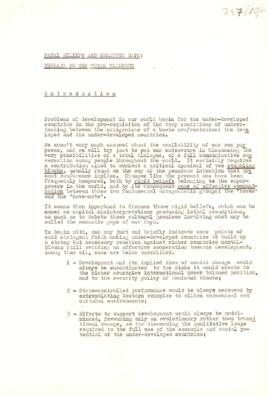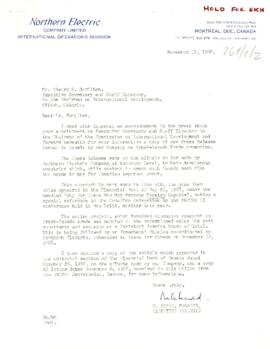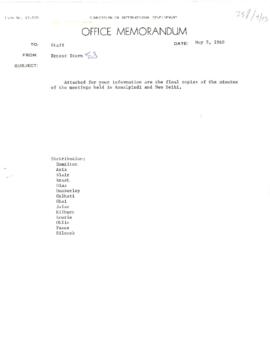Identity area
Reference code
Title
Date(s)
- 1961 - 1962, 1965, 1967 - 1970 (Creation)
Level of description
Fonds
Extent and medium
7.52 linear feet of textual records; 206 photographs (197 b&w, 9 col.); 12 audio reels
Context area
Name of creator
Biographical history
In August 1968, former Canadian Prime Minister and Nobel Peace Prize winner, Honorable Lester Bowles Pearson, accepted an invitation from the President of the World Bank, Robert S. McNamara, to form an international commission "to review the impact of external assistance on the development of the poorer nations over the past two decades", assess the results, and make recommendations for the future of aid and development.
The initiative for the Commission came from McNamara's predecessor, George D. Woods. Amid international concern about declining foreign aid available from major donor countries, particularly during the declared United Nations Development Decade, President Woods explored different methods to increase development funding. In 1967, Woods spent a weekend at Sussex University to discuss these problems with a small group of individuals including diplomat William Clark and Barbara Ward, author of the UN Midterm Report on the Decade. The meeting resulted in the proposal for a commission of experts to examine the state of development and the steps necessary for maintaining hope and progress. Woods launched the idea of a "grand assize" of experts when he spoke to the Swedish Bankers' Association in Stockholm on October 27, 1967 in his last major speech as Bank president. He stated that the World Bank would be prepared to finance necessary research and to assist in recruiting a group of experts to examine the development problem. According to Woods, "[s]uch a Grand Assize - judging the world's record and prospects of growth - should in any case precede any attempt to round off our faltering Decade of Development with a genuine reformation of policy". The proposal was formally instituted ten months later during McNamara's tenure as World Bank president.
The Commission on International Development, also known as the Pearson Commission, was financed by the World Bank but operated as a completely independent body, just as its members were not representatives of their respective governments. Chairman Pearson had the authority to assemble the Commission members and by mid-October 1968, seven prominent international figures, each from a different country and background, had agreed to serve with Pearson in a non-official capacity. They were: Sir Edward Boyle (United Kingdom); Roberto de Oliveira Campos (Brazil); C. Douglas Dillon (United States); Dr. Wilfried Guth (West Germany); Sir W. Arthur Lewis (St. Lucia); Robert E. Marjolin (France); and Dr. Saburo Okita (Japan).
Because of the crisis in aid shortfalls, the Commission decided that its report should be made available as early as possible. To complete its objective in a timely manner and to sufficiently study the multitude of topics, the Commission employed contractors to conduct the research. Between October and December 1969, the Commission was also staffed with senior professionals and experts, some of whom were World Bank employees on loan. The group was housed in an office building at 1900 L Street NW, Washington D.C.
The Commission's eight members met four times in order to direct the staff's work, to receive senior staff's analysis of their study topics, to make decisions about the ideas and conclusions, and to write the report. The first meeting was in Mont Gabriel near Montreal, December 16-17, 1968, followed by Rome (March 1969), Copenhagen (June 1969), and Geneva (August 1969). Between these meetings, the Commission also sponsored a series of regional hearings in developing countries across four continents. Pearson, accompanied by one or more commissioners, invited governments and in some cases distinguished private individuals, to come during the few days spent in each location and give testimony to the Commission on the full range of development issues under study. The regional hearings took place in Santiago, Abidjan, Kampala, Rawalpindi, New Delhi, Singapore, and Ankara, and were attended by government representatives of some seventy countries to present their views.
The Commission investigated a wide variety of topics, including the volume and terms of aid, the debt burden of developing countries, technical assistance, trade, private investment, economic growth, population control, and education and research. The findings and recommendations of the Commission on International Development were published September 15, 1969 under the title "Partners in Development". The report presented thirty-three recommendations and argued that developed countries needed to make a more substantial commitment to foreign aid and to economic development as a global initiative. Many of the proposals would involve the leadership and support of international organizations including World Bank Group and Organization for Economic Co-operation and Development (OECD).
The Commission was dissolved in 1969 following the completion of its report. "Partners in Development" was the first sustained evaluation of international development assistance.
Repository
Archival history
Records created by the independent Commission on International Development including reports, staff papers and meetings were given to the custody of the World Bank Group, and incorporated into Central Files by May 1970. A small number of Commission records in the possession of Secretary's Department were also added to the Central Files in 1974. All Commission records were transferred to the Archives by the Records Management Section in 1982.
Immediate source of acquisition or transfer
Content and structure area
Scope and content
Fonds consists of records documenting the activities and proceedings of the Commission on International Development formed to review and assess the results of the previous twenty years of development assistance. Although most of the records were created from the time of the Commission's establishment in 1968 to its dissolution in 1969, there are a few copies of external reports dated 1961 to 1962 used for the Commission's studies.
The fonds contains photographs, audio reels, and textual records documenting the establishment of the Commission, meetings and regional hearings, staff reports and research papers, and the Commission's final report. Also included in the fonds are records related to the World Bank President's Memoranda on Report Recommendations, the 1970 official Bank response to the Commission's findings.
Appraisal, destruction and scheduling
Accruals
No accruals are expected.
System of arrangement
Original order of the records has been maintained. Files are primarily arranged by subject.
Conditions of access and use area
Conditions governing access
Records are subject to the World Bank Access to Information Policy.
Conditions governing reproduction
Records are subject to the Copyright Policy of the World Bank Group.
Language of material
- English
- French
Script of material
Language and script notes
Physical characteristics and technical requirements
Finding aids
Allied materials area
Existence and location of originals
Existence and location of copies
Related units of description
Notes area
Alternative identifier(s)
Access points
Subject access points
Place access points
Name access points
Genre access points
Description control area
Description identifier
Institution identifier
Rules and/or conventions used
Internal World Bank Group Archives rules
Disclosure status
Level of detail
Dates of creation revision deletion
23 March 2020






















